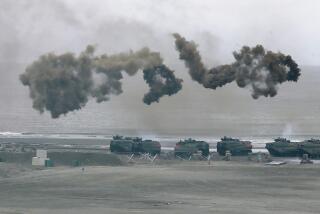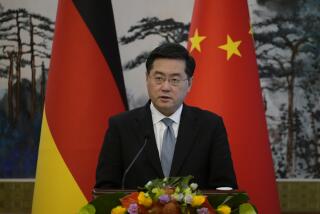China May Cut Aid to Cambodia Rebels
- Share via
BANGKOK, Thailand — With Vietnam completing another partial withdrawal of its troops in Cambodia this week, China has pledged to trim its military aid to resistance guerrillas in response to further pullouts.
According to press reports from Beijing, Premier Li Peng told reporters that China “will reduce military support (to the guerrillas) gradually, to let the world be at ease.”
Li’s statement appeared to mark continued Chinese flexibility on a settlement of the decade-long Cambodian war. He spoke to Indian reporters covering the Beijing visit of Indian Prime Minister Rajiv Gandhi, and his comments were published Tuesday in the official Chinese press.
No Sole Power
In recent months, Beijing has endorsed the proposal for an international peacekeeping force in Cambodia and agreed that none of the Cambodian factions, including China’s client Khmer Rouge guerrillas, should hold sole power in Phnom Penh, the Cambodian capital.
Vietnam, which drove the ruthless Khmer Rouge out of Phnom Penh in early 1979 and installed a successor government, has demanded an end to military aid to the guerrillas in return for a fixed schedule for withdrawal of its remaining troops.
The Chinese position, announced by Li, was apparently unilateral. Li did not mention the Vietnamese demand, and he gave no specifics on what he meant by a gradual reduction in military aid.
But Chinese officials have previously refused to cut any military support for the guerrillas until the Vietnamese forces are fully withdrawn. The increased Chinese flexibility has grown in tandem with its improving relations with the Soviet Union, Vietnam’s chief aid sponsor.
Current Withdrawal
With completion of the current withdrawal, Vietnamese military spokesmen have said their forces in Cambodia now number about 50,000. U.S. estimates put the figure at 90,000 to 100,000.
In Washington, State Department spokeswoman Phyllis Oakley said Tuesday that the United States wants Hanoi “to issue a precise timetable for the withdrawal of all Vietnamese troops in the context of an acceptable settlement for Cambodia.” This is the position held by Thailand and other members of the Assn. of Southeast Asian Nations supporting the guerrilla resistance. Full withdrawal and a political settlement, she said, would open the way to diplomatic relations between Washington and Hanoi.
Vietnam, mired in economic difficulties and facing an increasingly restive work force, particularly in the south, has pledged to withdraw all its troops by the end of 1990, or in the spring of 1989 if a political settlement is achieved.
Contacts With Factions
But political progress has proved elusive in a series of contacts among the Cambodian factions over the past year.
Although the resistance factions have clashed inside Cambodia, they have again coalesced behind the leadership of Prince Norodom Sihanouk, the one-time leader of the poor nation. Outside Paris last week, Khmer Rouge leader Khieu Samphan declared that his secretive and militarily powerful faction recognized Sihanouk as “our national leader.”
Speaking to journalists later, the voluble Sihanouk described Khieu Samphan as “probably a murderer,” but said he found him more acceptable than Hun Sen, premier of the Vietnamese-installed government in Phnom Penh, whom he has met three times over the past year. Hun Sen, according to the prince, “is a traitor.”
“I will only meet Hun Sen again once he has accepted my plan,” said the prince, who has proposed an interim, pre-election government of the four Cambodian factions under his leadership, which in effect would dissolve Hun Sen’s regime.
More to Read
Sign up for Essential California
The most important California stories and recommendations in your inbox every morning.
You may occasionally receive promotional content from the Los Angeles Times.













